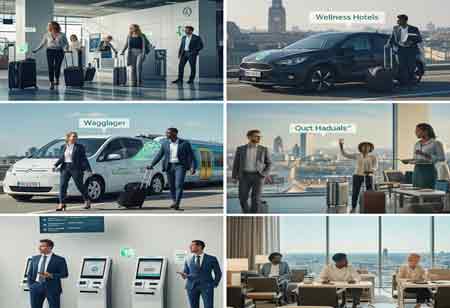Thank you for Subscribing to Hospitality Business Review Weekly Brief
Corporate Travel Experience Optimisation in Europe
The European corporate travel landscape is transforming with AI-driven personalisation, sustainability focus, and employee well-being, optimising travel experience and aligning with corporate values amidst evolving expectation and regulations.

By
Hospitality Business Review | Tuesday, August 05, 2025
Stay ahead of the industry with exclusive feature stories on the top companies, expert insights and the latest news delivered straight to your inbox. Subscribe today.
Fremont, CA: The corporate travel landscape in Europe is driven by technological advancements, evolving employee expectations, and a heightened focus on sustainability and duty of care. No longer simply about getting from point A to point B, modern business travel demands an optimised, personalised, and seamless experience that supports productivity and corporate values and prioritises every employee's well-being.
Key Trends Shaping European Corporate Travel
Artificial intelligence (AI) is changing corporate travel by enabling hyper-personalised itineraries, predictive cost intelligence, proactive disruption management, automated expense management, and voice-activated travel management. More importantly, this technology plays a significant role in helping companies reduce their carbon footprint and promote sustainable travel practices. Companies are integrating carbon calculators into booking platforms to monitor and reduce emissions, preferring rail travel, and partnering with hotels committed to sustainability initiatives. They are also implementing eco-friendly accommodations and dynamic travel policies. New EU regulations, like the Corporate Sustainability Reporting Directive, are driving companies to adopt more robust reporting tools, with AI at the forefront of these sustainability efforts.
Employee well-being is a top priority in corporate travel, with companies offering a range of benefits to ensure their workforce remains healthy and productive. These include flexible travel options, health-focused accommodations, mental health support, and leisure opportunities. Companies also minimise burnout by limiting back-to-back trips and providing adequate rest periods between travel. This focus on employee well-being enhances the travel experience and underscores the company's commitment to a healthy work-life balance.
To ensure the safety and security of business travellers, European companies are strengthening their Duty of Care obligations through real-time tracking and communication, comprehensive risk assessments, 24/7 support, pre-trip briefings and training, and inclusive travel policies. These changes improve traveller satisfaction, policy compliance, and employee well-being.
Implementing an Optimised Corporate Travel Experience in Europe
To optimise the corporate travel experience in Europe, organisations should invest in integrated travel management platforms, embrace AI-powered tools for personalisation and predictive analytics, develop dynamic and flexible policies, prioritise rail over air for short-haul journeys, invest in traveler well-being initiatives, strengthen duty of care protocols, engage with employees, partner with sustainable suppliers, and focus on cost optimisation with a holistic view. These strategies will help companies streamline processes, enhance traveller satisfaction, and prioritise employee productivity and retention through improved travel experiences. The focus on cost optimisation will reassure organisations about the financial benefits of the proposed strategies. Additionally, AI can be used for predictive pricing and employee productivity.
As Europe navigates geopolitical uncertainties and economic shifts, corporate travel will remain vital to business growth. The focus will increasingly be on creating purposeful and innovative travel experiences that are efficient and cost-effective, prioritise employees' well-being, and align with broader corporate social responsibility goals. The intelligent integration of technology, particularly AI, combined with a human-centric approach, will be key to unlocking the full potential of corporate travel experience optimisation in Europe, ensuring efficient and confident corporate travel.







